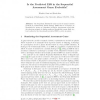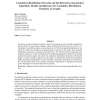1632 search results - page 95 / 327 » Modeling billiards games |
GECCO
2004
Springer
15 years 3 months ago
2004
Springer
The Sequential Assessment Game model of animal contests predicts an evolutionarily stable strategy (ESS) that is a sequence of thresholds for giving up. Simulated evolution experim...
STOC
2003
ACM
15 years 10 months ago
2003
ACM
We introduce a simple network design game that models how independent selfish agents can build or maintain a large network. In our game every agent has a specific connectivity requ...
126
click to vote
GECCO
2007
Springer
15 years 4 months ago
2007
Springer
This paper investigates the impacts of individual egoistic and altruistic behaviors in a virtual society built upon the Vidya game, used here as the social simulation and Multiage...
IAT
2008
IEEE
15 years 4 months ago
2008
IEEE
This paper extends the link between evolutionary game theory and multi-agent reinforcement learning to multistate games. In previous work, we introduced piecewise replicator dynam...
JMLR
2011
14 years 4 months ago
2011
We present a class of graphical models for directly representing the joint cumulative distribution function (CDF) of many random variables, called cumulative distribution networks...



